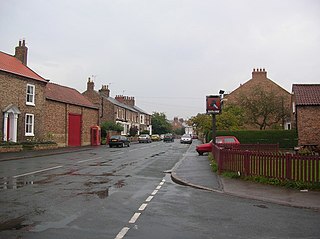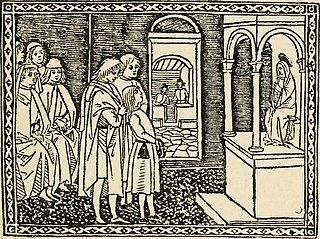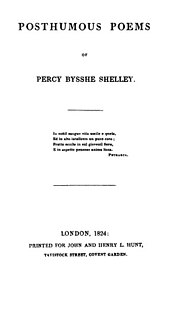Related Research Articles

Niccolò di Bernardo dei Machiavelli, occasionally rendered in English as Nicholas Machiavel, was an Italian diplomat, author, philosopher and historian who lived during the Renaissance. He is best known for his political treatise The Prince, written in about 1513 but not published until 1532. He has often been called the father of modern political philosophy and political science.

Othello is a tragedy written by William Shakespeare, probably in 1603, set in the contemporary Ottoman–Venetian War (1570–1573) fought for the control of the Island of Cyprus, a possession of the Venetian Republic since 1489. The port city of Famagusta finally fell to the Ottomans in 1571 after a protracted siege. The story revolves around two characters, Othello and Iago. Othello is a Moorish military commander who was serving as a general of the Venetian army in defence of Cyprus against invasion by Ottoman Turks. He has recently married Desdemona, a beautiful and wealthy Venetian lady much younger than himself, against the wishes of her father. Iago is Othello's malevolent ensign, who maliciously stokes his master's jealousy until the usually stoic Moor kills his beloved wife in a fit of blind rage. Due to its enduring themes of passion, jealousy, and race, Othello is still topical and popular and is widely performed, with numerous adaptations.
Henry Percy, 2nd Earl of Northumberland was an English nobleman and military commander in the lead up to the Wars of the Roses. He was the son of Henry "Hotspur" Percy, and the grandson of Henry Percy, 1st Earl of Northumberland. His father and grandfather were killed in different rebellions against Henry IV in 1403 and 1408 respectively, and the young Henry spent his minority in exile in Scotland. Only after the death of Henry IV in 1413 was he reconciled with the Crown, and in 1414 he was created Earl of Northumberland.

Tockwith is a village and civil parish in the Harrogate district of North Yorkshire, England, near the town of Wetherby and the city of York. There has been a village on the site since at least 1086 when Tocvi was mentioned in the Domesday Book. Tockwith's greatest claim to fame is being used as a staging post by Oliver Cromwell prior to the Battle of Marston Moor in 1644. He made reference to Tockwith in his diaries, in which he said: "If heaven should be half as blessed as the fields of Tockwith, all those who should pass St. Peter's Gate shall be met with joys unequalled".

Garret Barry, also called Gerat, was an Irish soldier and military writer, who fought for Spain in the Eighty Years' War and then for the Irish insurgents in the Rebellion and the Confederate Wars. When young he left Kinsale at its surrender in 1602 for Spain where he took service, first as marine in the Atlantic Fleet and then in the Army of Flanders. While in Spanish service, he fought at the Siege of Breda in 1624/1625. He retired with the rank of captain in 1632. Returning to Ireland he was at the Rebellion appointed general of the insurgents' Munster Army. He took Limerick in June 1642 but was defeated at Liscarroll by Inchiquin in September. He was confirmed as General of the Munster Army by the Irish Catholic Confederation but was in practice superseded by Castlehaven in 1643.

The Symphony No. 6 in E-flat minor, Op. 111, by Sergei Prokofiev was completed and premiered in 1947. According to Simon Morrison, its premiere was the "last unhampered, unmediated success" the composer would ever experience.
Mary Hays (1759–1843) was an autodidact intellectual who published essays, poetry, novels and several works on famous women. She is remembered for her early feminism, and her close relations to dissenting and radical thinkers of her time including Robert Robinson, Mary Wollstonecraft, William Godwin and William Frend. She was born in 1759, into a family of Protestant dissenters who rejected the practices of the Church of England. Hays was described by those who disliked her as 'the baldest disciple of [Mary] Wollstonecraft' by The Anti Jacobin Magazine, attacked as an 'unsex'd female' by clergyman Robert Polwhele, and provoked controversy through her long life with her rebellious writings. When Hays's fiancé John Eccles died on the eve of their marriage, Hays expected to die of grief herself. But this apparent tragedy meant that she escaped an ordinary future as wife and mother, remaining unmarried. She seized the chance to make a career for herself in the larger world as a writer.

Julia Vida Dutton Scudder (1861–1954) was an American educator, writer, and welfare activist in the social gospel movement.
Nationality words link to articles with information on the nation's poetry or literature.
Lust's Dominion, or The Lascivious Queen is an English Renaissance stage play, a tragedy written perhaps around 1600, probably by Thomas Dekker in collaboration with others and first published in 1657.

Othello is a character in Shakespeare's Othello. The character's origin is traced to the tale "Un Capitano Moro" in Gli Hecatommithi by Giovanni Battista Giraldi Cinthio. There, he is simply referred to as the Moor.

Dumbshow, also dumb show or dumb-show, is defined by the Oxford Dictionary of English as "gestures used to convey a meaning or message without speech; mime." In the theatre the word refers to a piece of dramatic mime in general, or more particularly a piece of action given in mime within a play "to summarise, supplement, or comment on the main action".

The poetic style of John Milton, also known as Miltonic verse, Miltonic epic, or Miltonic blank verse, was a highly influential poetic structure popularized by Milton. Although Milton wrote earlier poetry, his influence is largely grounded in his later poems: Paradise Lost, Paradise Regained, and Samson Agonistes.

Exodus is the title given to an Old English alliterative poem in the 10th century Junius manuscript. Exodus is not a paraphrase of the biblical book, but rather a re-telling of the story of the Israelites' flight from Egyptian captivity and the Crossing of the Red Sea in the manner of a "heroic epic", much like Old English poems Andreas, Judith, or even Beowulf. It is one of the densest, most allusive and complex poems in Old English, and is the focus of much critical debate.

Julian and Maddalo: A Conversation (1818–19) is a poem in 617 lines of enjambed heroic couplets by Percy Bysshe Shelley published posthumously in 1824.

Coleridge's notebooks, of which seventy-two have survived, contain a huge assortment of memoranda set down by the poet Samuel Taylor Coleridge from 1794 until shortly before his death in 1834. Coleridge's biographer Richard Holmes summarised the range of material covered as "travels, reading, dreams, nature studies, self-confession and self-analysis, philosophical theories, friendships, sexual fantasies, lecture notes, observations of his children, literary schemes, brewing recipes, opium addiction, horrors, puns, prayers." Some of this vast storehouse of material found its way into Coleridge's published works, and it is also believed to have directly influenced Wordsworth's poems. The notebooks have been described as "unique in the annals of Romantic autobiography", and as "perhaps the unacknowledged prose masterpiece of the age".

Scottish literature in the eighteenth century is literature written in Scotland or by Scottish writers in the eighteenth century. It includes literature written in English, Scottish Gaelic and Scots, in forms including poetry, drama and novels. After the Union in 1707 Scottish literature developed a distinct national identity. Allan Ramsay led a "vernacular revival", the trend for pastoral poetry and developed the Habbie stanza. He was part of a community of poets working in Scots and English who included William Hamilton of Gilbertfield, Robert Crawford, Alexander Ross, William Hamilton of Bangour, Alison Rutherford Cockburn, and James Thompson. The eighteenth century was also a period of innovation in Gaelic vernacular poetry. Major figures included Rob Donn Mackay, Donnchadh Bàn Mac an t-Saoir, Uillean Ross and Alasdair mac Mhaighstir Alasdair, who helped inspire a new form of nature poetry. James Macpherson was the first Scottish poet to gain an international reputation, claiming to have found poetry written by Ossian. Robert Burns is widely regarded as the national poet.
A Blot in the 'Scutcheon is a tragedy in blank verse by Robert Browning, published in 1843 and acted in the same year.
The Return of the Druses is a tragedy in blank verse by Robert Browning. It was originally published as the fourth number of Bells and Pomegranates in 1843. The manuscript was first named Mansoor the Hierophant.
A Soul's Tragedy is a play by Robert Browning. It was first printed with Luria as the concluding number of Bells and Pomegranates in April 1846. It is a tragi‐comedy in two acts: the first in verse, the second in prose.
